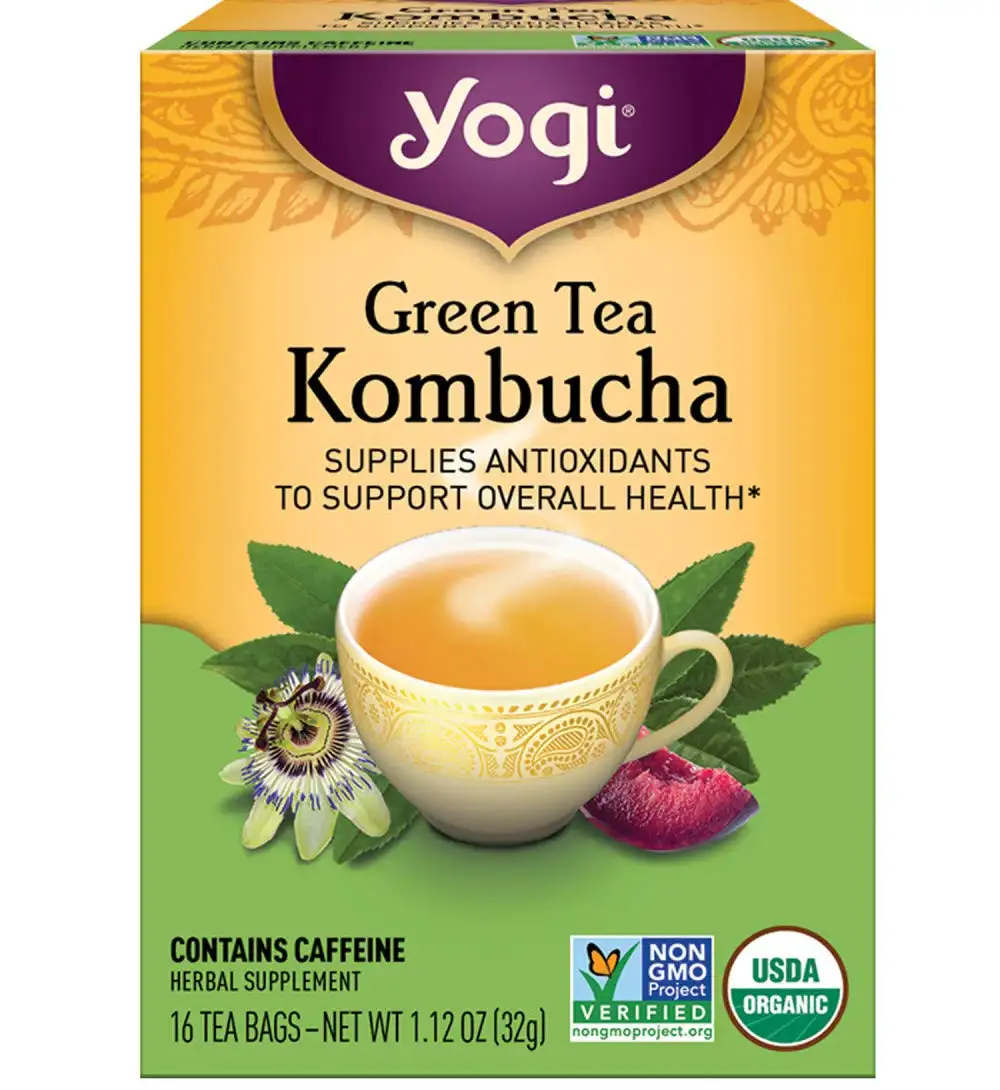Kombucha Tea Review: Kombucha tea has been gaining popularity in recent years as a health drink with numerous potential benefits. But is it really worth the hype? In this kombucha tea review, we will take a closer look at what kombucha tea is, any red flags to watch out for, the pros and cons of drinking it, reviews from customers, whether it is legit or a scam, and ultimately, if it is worth trying.
About Kombucha Tea
Kombucha tea originates from a unique fermentation process involving black or green tea, sugar, and a symbiotic culture of bacteria and yeast (SCOBY). This concoction undergoes a fermentation period, typically ranging from a week to a month, during which the sugar serves as food for the yeast and bacteria. The result is a beverage characterized by its distinctive tangy taste and a slight effervescence, likened by some to a mild, fizzy soft drink. During fermentation, the tea is transformed, producing a rich array of probiotics, organic acids, and antioxidants. These components are credited with providing kombucha its reputed health benefits. Probiotics, for instance, play a crucial role in maintaining a balanced gut microbiome, which is essential for effective digestion and overall gut health. Organic acids, such as acetic acid, are believed to have antimicrobial properties and may help stabilize blood sugar levels. Antioxidants in kombucha, derived from the tea itself, are known for their ability to combat oxidative stress within the body, potentially reducing the risk of chronic diseases. Despite its ancient origins, kombucha has surged in popularity in modern health and wellness circles, celebrated not only for its unique flavor profile but also for its potential to support a wide range of health benefits. As with any fermented product, the final nutrient content and health benefits of kombucha can vary significantly based on the specifics of the fermentation process, including the duration, the type of tea used, and the sugar content.
Red Flags to Watch Out For
When considering incorporating kombucha tea into your diet, vigilance regarding certain concerns is advisable. A primary red flag is the varying sugar content among different kombucha brands. While the fermentation process naturally reduces the initial sugar added, commercial variants may have additional sugar for taste enhancement, potentially negating some health benefits. Always scrutinize nutrition labels to ensure you’re selecting a lower sugar option that aligns with your dietary goals.
Another area of concern involves the caffeine content. Given kombucha’s tea-based origins, it inherently contains caffeine. Although typically lower than in a standard cup of tea or coffee, those sensitive to caffeine or looking to limit their intake should take note of the specific tea used in the kombucha’s production.
Homemade kombucha brews carry their own set of red flags, primarily the risk of contamination. Incorrect preparation or unsanitary conditions can lead to the growth of harmful bacteria, making the kombucha unsafe to consume. Ensuring a sterile environment and following proper brewing guidelines is crucial for those choosing to brew at home.
Lastly, kombucha contains trace amounts of alcohol as a byproduct of fermentation. While the alcohol content is generally below 0.5% in commercial products, making it non-alcoholic by legal standards, it’s something to be aware of, especially for individuals avoiding alcohol for personal or health reasons.
The Pros of Drinking Kombucha Tea
Kombucha tea is celebrated for its array of health-promoting qualities, making it a favored choice among wellness enthusiasts. Central to its benefits are the probiotics it contains. These beneficial bacteria are crucial for maintaining a healthy digestive system, potentially alleviating digestive disorders and improving gut health. By contributing to a balanced gut microbiome, kombucha supports efficient digestion and can bolster the immune system. Additionally, the fermentation process enriches kombucha with antioxidants. These compounds are known for their ability to neutralize harmful free radicals, potentially lowering the risk of inflammation and chronic diseases. Another noteworthy advantage of kombucha is its contribution to mental wellness. Some individuals report feeling more energized and experiencing enhanced mental clarity after incorporating kombucha into their routine. This may be attributed to the presence of B vitamins and other compounds that support brain function and energy production. Moreover, for those seeking to reduce their intake of sugary drinks, kombucha offers a healthier alternative. Its tangy and slightly sweet flavor can satisfy cravings without the high sugar content found in many commercial beverages. In essence, kombucha tea presents a multifaceted approach to wellness, offering benefits that extend beyond simple hydration to encompass gut health, antioxidant support, and mental vitality, making it a valuable addition to a health-conscious lifestyle.
The Cons of Kombucha Tea
Despite the numerous health benefits attributed to kombucha tea, there are some downsides that consumers should be aware of. One notable concern is its acidity, which might not be well-tolerated by everyone. Individuals with sensitive digestive systems or conditions like acid reflux might find kombucha aggravates their symptoms. Additionally, the initial introduction of kombucha into one’s diet may lead to discomfort, including bloating or digestive disturbances, as the body adjusts to the influx of probiotics.
Another point of consideration is the caffeine content. Originating from black or green tea, kombucha retains some of the caffeine present in these teas. While the amount is generally less than that found in a regular cup of coffee or tea, it could still affect individuals sensitive to caffeine, potentially impacting sleep patterns or causing jitteriness.
Furthermore, while kombucha offers a lower sugar alternative to many commercial beverages, the sugar content can vary significantly between brands. Some commercially available kombuchas add extra sugar post-fermentation for flavor, which could counteract the health benefits for individuals monitoring their sugar intake.
Lastly, it’s important to consider the potential for allergic reactions or sensitivities to ingredients in kombucha, including reactions to the SCOBY itself or flavorings added to certain brands. These factors underscore the importance of moderation and paying close attention to how one’s body reacts to kombucha consumption.
Reviews By Customers
Feedback from individuals who have incorporated kombucha tea into their daily routine paints a varied picture. On one hand, there are enthusiasts who extol its virtues, highlighting an array of benefits from regular consumption. These proponents often cite noticeable improvements in their overall well-being, including enhanced energy levels, better digestion, and even clearer skin. The unique taste of kombucha also garners praise from those who appreciate its distinctive flavor as an enjoyable alternative to more conventional beverages.
Conversely, there are consumers who have not had as positive an experience with kombucha tea. Some of these individuals report adverse reactions such as bloating and gastrointestinal discomfort, suggesting that the drink may not agree with everyone’s digestive system. A few also express dissatisfaction with the flavor profile of kombucha, finding it either too sour or simply unpalatable.
Among the customer feedback, there’s a consensus that personal tolerance and taste preference play significant roles in determining one’s experience with kombucha tea. It’s evident that while some have found kombucha to be a beneficial addition to their health regimen, others advise caution and recommend listening to one’s body when introducing it into the diet. This divergence in reviews underscores the importance of personal experimentation to gauge how well kombucha aligns with individual health goals and dietary preferences.
Is It Legit or a Scam?
Kombucha tea’s rise in popularity often prompts questions about its legitimacy and whether it’s merely a fad or if it holds genuine health benefits. Delving into the science and testimonials behind kombucha, it becomes clear that this fermented tea is far from a scam. While exaggerated claims do circulate, particularly around miraculous health cures, there’s credible evidence supporting kombucha’s positive effects on gut health, thanks to its probiotic content. However, it’s essential to approach kombucha with realistic expectations. The drink isn’t a panacea for all ailments but rather a potentially beneficial component of a balanced diet.
Skepticism mainly arises when marketing claims overshoot the science-backed benefits, leading to misconceptions about what kombucha can truly offer. That said, countless enthusiasts and some preliminary studies suggest improvements in digestion, energy levels, and overall well-being linked to regular consumption of the beverage. It’s also vital to acknowledge the craft and tradition behind kombucha brewing, which spans centuries, underscoring its legitimacy as a traditional health drink.
Navigating the kombucha market requires discernment—looking beyond sensational claims and focusing on quality and composition. The healthiest options are those with minimal added sugars and artificial ingredients. As the kombucha industry continues to evolve, so does the understanding and appreciation of its genuine health contributions, steering the narrative away from skepticism and towards informed consumption.
Is It Worth Trying?
Determining the value of kombucha tea in your diet hinges on individual taste and the body’s reaction to it. For those intrigued by its unique flavor and potential health benefits, giving kombucha a try might be a rewarding exploration. The key lies in starting with small amounts to observe how your body responds, especially if you’re new to fermented products. Keep in mind that while many enjoy its distinct taste and report feeling revitalized and experiencing digestive improvements, others may not find it as agreeable or beneficial.
Consideration should also be given to the type of kombucha you choose. Opting for brands with lower sugar content and natural ingredients can enhance the health benefits while minimizing potential drawbacks. For those brewing at home, ensuring cleanliness and proper fermentation methods is paramount to avoid unwanted contaminants.
In essence, your curiosity and willingness to experiment play a significant role in determining whether kombucha merits a place in your lifestyle. By approaching it with an open mind and attentiveness to your body’s signals, you can make an informed decision on its suitability for you. Remember, what works well for one person might not for another, highlighting the importance of personalized exploration in the realm of health and wellness beverages.
Conclusion
Kombucha tea stands as a multifaceted beverage that has stirred both curiosity and skepticism in equal measures. While it isn’t a magical cure-all, its potential health benefits, particularly related to gut health and digestion, make it an interesting option for those looking to diversify their dietary choices. The drink’s unique taste and probiotic content are appealing to many, but it’s crucial to approach kombucha with a balanced perspective. Acknowledging the downsides, such as its sugar content and acidity, allows for a more informed decision about incorporating it into your lifestyle. Individual experiences with kombucha vary widely, emphasizing the importance of personal trial and attentive observation of your body’s response. In navigating the kombucha phenomenon, the blend of historical tradition and modern health consciousness presents a compelling case for at least considering its inclusion in a balanced diet, provided it aligns with your health goals and dietary preferences.
FAQs
- **Can drinking kombucha contribute to weight management?**
Kombucha tea, with its lower calorie and sugar profile compared to many sweetened beverages, may fit well into a weight management plan. However, it’s crucial to understand that kombucha alone isn’t a weight loss solution. Effective weight management typically involves a holistic approach, including a balanced diet and regular physical activity. Incorporating kombucha could offer a healthier alternative to high-calorie drinks, potentially aiding in overall calorie reduction.
- **Is daily consumption of kombucha advisable?**
For the majority of individuals, enjoying kombucha on a daily basis can be a safe part of their diet when consumed in moderation. It’s essential to listen to your body and observe how it reacts to kombucha, especially if you’re not accustomed to fermented foods and beverages. Certain populations, including those with specific health conditions, pregnant or breastfeeding women, and individuals sensitive to caffeine or acidity, should seek advice from a healthcare professional before making kombucha a regular feature of their diet.
- **How much kombucha is safe to drink in a day?**
While there’s no one-size-fits-all answer, starting with small servings, such as 4 to 8 ounces per day, can help gauge how your body responds. If well-tolerated, some may comfortably consume more, but it’s wise to maintain a balance and not exceed consumption that might lead to digestive discomfort or exceed one’s caffeine tolerance.
- **Can kombucha cause digestive issues?**
Though kombucha is famed for its probiotic content and potential digestive benefits, initial consumption may lead to temporary digestive symptoms for some, such as bloating or gas, as the body adjusts to the influx of probiotics. These symptoms typically diminish with continued, moderate consumption.




